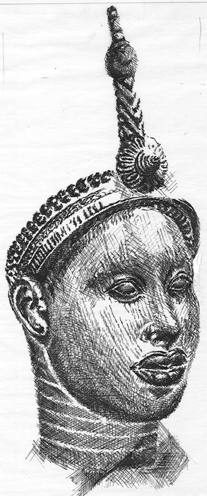II OBATALA.

Obatala is thé chief god of thé Yorubas. The name means "Lord of thé White Cloth" (Oba-ti-ala.), and is explained by thé fact that white is thé colour sacred to Obatala, whose temples, images, and paraphernalia are always painted white, and whose followers wear white cloths. Another dérivation is Oba-ti-ala "Lord of Visions," and this gains some probability from thé fact that Obatala has thé epithets of Orisha oj'enia, "The Orisha who enters man," and Alabalese (Al-ba-ni-ase),10 "He who predicts thé future," because he inspires thé oracles and priests, and unveils futurity by means of visions. "Lord of thé White Cloth," however, is thé translation most commonly adopted, and appears to be thé correct one. The god is always represented as wearing a white cloth.
Obatala, say thé priests, was made by Olorun, who then handed over to him thé management of thé firmament and thé world, and himself retired to rest. Obatala is thus also a sky-god, but is a more anthropomorphic conception than Olorun, and performs functions which are not in thé least connected with thé firmament. According to a myth, which is, however, contra-dicted by another, Obatala made thé first man and woman out of clay, on which account he has thé title of Alamorere, "Owner of thé best clay;" and because he kneaded thé clay himself he is called Orisha kpokpo, "The Orisha who kneads clay" (kpo, to knead or temper clay). Though this point is disputed by some natives, ail are agreed that Obatala forms thé child in thé mother's womb, and women who désire to become mothers address their prayers to him; while albinoism and congénital deformities are regarded as his handiwork, done either to punish some neglect towards him on thé part of thé parents, or to remind his worshippers of his power.
Obatala is also styled "Protector of thé Town Gates," and in this capacity is represented as mounted on a horse, and armed with a spear. On thé panels of thé temple doors rude carvings are frequently seen of a horseman with a spear, surrounded by a léopard, tortoise, fish, and serpent. Another epithet of Obatala is Obatala gbingbiniki, "The enormous Obatala." His spécial offerings are edible snails
Among the ewe-speaking People of Porto-Novo, Obatala determines the guilt or innocence of accused persons by mean of an oracle termed Onshe (messenger, ambassador) It consist of a hollow cylinder of wood about 31/2 feet in length and 2 feet in diameter, one end of which is covered with draperies and the other closed with shells of the edible snail. This cylinder is placed on the head of the accused, who kneels on the ground holfing it firmly on his head with a hand at each side. The god being then invoked by the priests, causes thé cylinder to rock backwards and forwards, and finally to fall to thé ground. If it should fall forward thé accused is innocent, if backward guilty. The priests say that Obatala, or a subordinate spirit to whom he députes thé duty, strikes thé accused, so as to make thé cylinder fall in thé required direction; but sceptics and native Christians say that a child is concealed in thé cylinder and overbalances it in front or behind, according to instructions given beforehand by thé priests. They add that when a child has served for a year or two and grown too big for thé cylinder he is put to death, in order that thé secret may be preserved; and is succeeded by another, who, in his turn, undergoes thé same fate-but ail this is mere conjecture.
Binason Avekes, quoted from Yoruba speaking peoples of the slaves coast of West Africa, by A. B. Ellis
Copyright, Blaise APLOGAN, 2010,© Bienvenu sur Babilown
Toute republication de cet article doit en mentionner et l’origine et l’auteur sous peine d’infraction
![]()
Commentaires